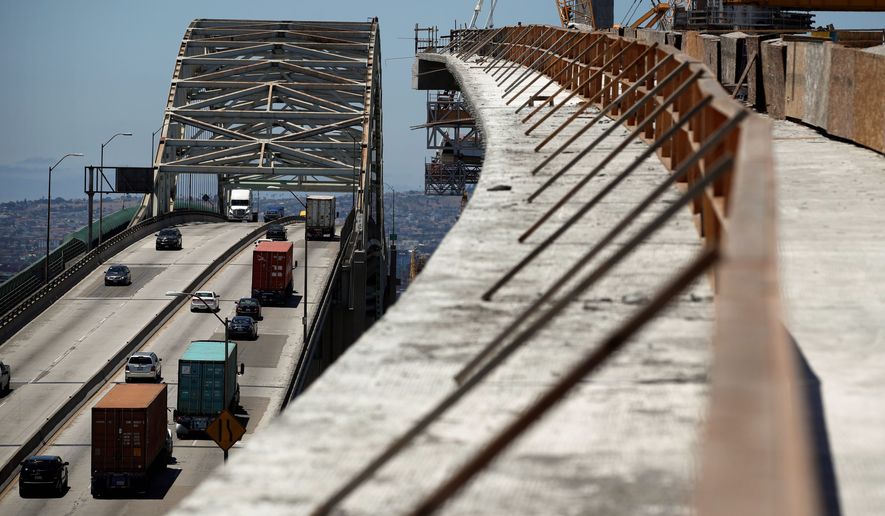NEWSMAKER INTERVIEW:
Rep. Sam Graves, the top Republican on the House Transportation and Infrastructure Committee, has offered up a new tax on every mile traveled in cars or trucks to help pay for roughly $1 trillion for badly needed highway, bridge and other infrastructure projects.
Mr. Graves floated the vehicle mileage tax, or VMT, despite the inevitable blowback he will receive from the party’s anti-tax base.
It is a bold opening bid compared to the Democrats’ top tax writer, Rep. Richard Neal of Massachusetts, who said they want to wait for President Trump to make the first move on paying for infrastructure.
“The president doesn’t pass legislation,” Mr. Graves, of Missouri, told The Washington Times. “I think Congress needs to step up and let’s do our job.”
The VMT would formulate a fee based on how much a person drives. In other words, tax road use.
The fee could be imposed immediately on commercial vehicles that already track mileage and easily formulated to record mileage of private vehicles, Mr. Graves said.
Grover Norquist, president of Americans for Tax Reform, came down hard against the VMT proposal and any other new tax to finance what he called far-flung infrastructure plans.
“The idea of thinking about raising taxes to pay for one of those Obama-style stimulus packages — that has little to do with roads — is obscene,” he said. “It’s just a spending project.”
The Obama administration in 2009 spent $48 billion for supposedly shovel-ready infrastructure projects as part of a $787 billion stimulus package during the recession that failed to make a dent in the country’s backlog of needed work on road, bridge, waterways and airports.
America’s infrastructure woes are well documented.
The American Society of Civil Engineers’ in 2017 gave the U.S. a D+ for infrastructure, including a D+ for the power grid, a D for airports and a D- for transit.
The group estimated that fixing the nation’s crumbling highways, bridges and other infrastructure would cost $4.5 trillion by 2025.
House Democrats’ proposed framework for an infrastructure package included $329 billion for roads and bridges, $55 billion for passenger rail, $30 billion for airport renovations, $50.5 billion for wastewater projects, $86 billion for expanding broadband to rural areas and urban deserts, and $12 billion for an updated 911 system.
The five-year plan is not fully formed legislation but serves as a foundation for future bills. Democrats are hoping the package extends beyond renovating bridges and roads to include measures aimed at climate change and access to broadband.
Mr. Graves called the framework a “wish list” but said it got the debate started.
“That’s their starting point and we have our starting point. That’s what they are. They’re both starting points,” he said.
A chief Republican priority is ensuring the sustainability of the Highway Trust Fund, which finances transportation projects with federal taxes of 18.4 cents per gallon on gasoline and 24.4 cents per gallon on diesel fuel.
However, the gas tax, which has not been raised since 1993, is becoming obsolete with the advent of electric cars and other advances that reduce fuel consumption. Hence, the proposed VMT.
Cutting down on red tape is another key issue for Republicans. They hope removing bureaucratic hurdles in the permitting process will cut costs and speed up projects.
“Time is money,” Mr. Graves said. “That’s what we’re hearing from every state out there. It’s just taking too long.”
Mr. Trump in his State of the Union address touted the Senate’s bipartisan infrastructure plan that would spend $287 billion on transportation projects. However, how to pay for it remains elusive.
For all the infrastructure proposals, the sticking point is where to get the money.
Last spring, Democrats and Mr. Trump attempted to hammer out a bipartisan deal on infrastructure, even getting so far as to announce a tentative $2 trillion plan.
Hopes were quickly dashed.
Mr. Trump abruptly ended a meeting about the plan with House Speaker Nancy Pelosi and Senate Minority Leader Charles E. Schumer when the negotiations became tangled in the Democrats’ impeachment effort.
Despite lingering animosity from the impeachment trial and the added pressure of the 2020 election calendar, Mr. Graves and committee Chairman Peter DeFazio, Oregon Democrat, have said they are willing to work across the aisle on the issue.
After all, infrastructure is bipartisan even if paying for it isn’t.
“Peter and I get along fine,” Mr. Graves said. “That has always been the tradition of the committee. I don’t see that changing.”
• Gabriella Muñoz can be reached at gmunoz@washingtontimes.com.




Please read our comment policy before commenting.